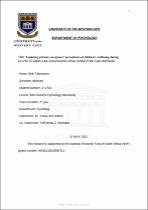| dc.contributor.advisor | Adonis, Tracey-Ann | |
| dc.contributor.author | Sihle Tafaranazvo, Mamutse | |
| dc.contributor.author | Mamutse, Sihle Tafaranazvo | |
| dc.date.accessioned | 2023-11-29T11:04:18Z | |
| dc.date.available | 2023-11-29T11:04:18Z | |
| dc.date.issued | 2023 | |
| dc.identifier.uri | http://hdl.handle.net/11394/10590 | |
| dc.description | Magister Artium (Psychology) - MA(Psych) | en_US |
| dc.description.abstract | The COVID-19 pandemic produced threatening and chaotic environments for children, thus heightening their vulnerability to its effects and on their overall wellbeing. Surveys across the world indicated that primary caregivers noticed COVID-19 lockdown-related behavioural problems in their children. Evidence from the literature indicated that COVID-19 prevention measures coupled with disrupted schooling for children, economic burdens for primary caregivers, and interrupted social life has generated a multitude of health challenges for many, including children. In low-and-middle-income countries (LMIC) such as South Africa, environmental security and safety already poses schooling challenges. Furthermore, within pandemic conditions, adequate environments conducive to remote learning was impossible due to the scarcity of digital learning resources caused by the inequity of resource distribution. | en_US |
| dc.language.iso | en | en_US |
| dc.publisher | University of the Western Cape | en_US |
| dc.subject | Primary caregivers | en_US |
| dc.subject | Low socioeconomic | en_US |
| dc.subject | School | en_US |
| dc.subject | Cape Metropole | en_US |
| dc.subject | COVID-19 | en_US |
| dc.title | Exploring primary caregivers’ perceptions of children’s wellbeing during COVID-19 within a low socioeconomic school context in the Cape Metropole | en_US |
| dc.rights.holder | University of the Western Cape | en_US |

